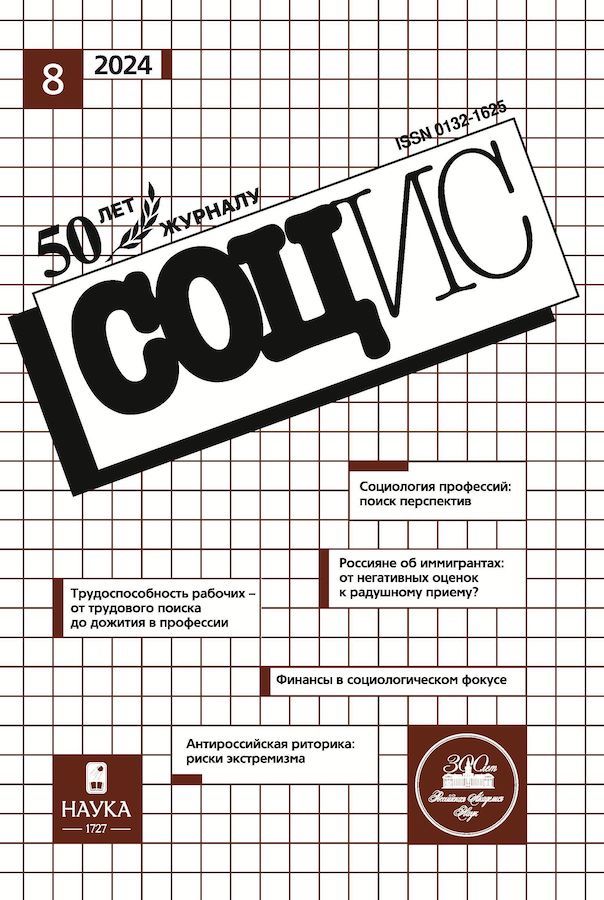Patriotism as a pragmatic and/or affective choice (on the materials of the Republic of Sakha (Yakutia))
- Authors: Vasileva O.V.1
-
Affiliations:
- Institute for Humanities Research and Indigenous Studies of the North of SB RAS
- Issue: No 8 (2024)
- Pages: 94-104
- Section: POLITICAL SOCIOLOGY
- URL: https://rjonco.com/0132-1625/article/view/661812
- DOI: https://doi.org/10.31857/S0132162524080072
- ID: 661812
Cite item
Abstract
The article is devoted to the problem of patriotism in the context of the relationship of this phenomenon with the globalization processes and a crisis of the capitalist system. Theoretical approaches to the analysis of patriotism as a phenomenon of modern society associated with the importance of the nation-state in the life of society are discussed. The diminishing role of the state in the course of globalization was interpreted as a way to abandon national thinking and a sense of belonging to nation-states. The article attempts to determine the influence of such socio-demographic factors as age, education and socio-economic status on the declaration of a position on patriotism, and also reveals the influence of the value of cosmopolitan and national vision. The article presents the results of a questionnaire survey of the population conducted in the Republic of Sakha (Yakutia) in the spring of 2024. The relationship between the respondent’s declared position on patriotism and socio-demographic characteristics is established: the respondents’ answers depend on age, socio-economic status, level of education. It is found that the group of patriots is not homogeneous in terms of value orientations. Two types of patriots were identified: those oriented to the choice of cosmopolitan or national vision attitudes. The statistically confirmed difference between the answers of patriots with different value orientations with regard to the level of trust in the President of the Russian Federation and assessment of the historical past has been revealed.
Keywords
Full Text
About the authors
Olga V. Vasileva
Institute for Humanities Research and Indigenous Studies of the North of SB RAS
Author for correspondence.
Email: Ovasileva.igi@mail.ru
Cand. Sci. (Polit.), Senior Researcher
Russian Federation, YakutskReferences
- Basharin G. P. (1987) Historical significance of the voluntary entry of Yakutia in the XVII century into the Russian state. In: Historical ties of the peoples of Yakutia with the Russian people. Ed. by V. N. Ivanov, M. М. Fedorov. Yakutsk: Kn. Izd-vo. (In Russ.)
- Bauman Z. (2005) The Individualized Society. Moscow: Logos. (In Russ.)
- Beck U. (2008) Cosmopolitan Vision. Moscow: CIPIO. (In Russ.)
- Blackburn M. (2020) Mainstream Russian Nationalism and the “State-Civilization”. In: Identity: Perspectives from Below. Nationalities Papers: 1–19.
- Bourdieu P. (2005) Sociology of social space. Moscow: IES: Aletheia. (In Russ.)
- Chaly V. (2011) Rationality in liberal philosophical theories. Kantovskiy Sbornik [Kantian Journal]. No. 4(38): 29–36. (In Russ.)
- Chernysh M. F. (2022) Social institutions as a factor of civilizational change. Rossiya reformiruyushchayasya [Russia reforming]. No. 21: 67–97. (In Russ.)
- Drobizheva L. M. (2014) Russian, ethnic, regional identity: a longitudinal study of 1993–2012. Vestnik RGNF [Bulletin of the RHSF]. No. 2 (75): 71–83. (In Russ.)
- Goode J. (2017) Everyday Patriotism and Ethnicity in Today’s Russia. In: Russia Before and After Crimea: Nationalism and Identity. Ed. by P. Kolstø, H. Blakkisrud. Edinburgh: Edinburgh University Press: 258–281.
- Ignatyeva V. B. (1999) The Republic of Sakha (Yakutia): a retrospective of ethnopolitical history. Novosibirsk: Nauka, Sib. izd. firma RAN. (In Russ.)
- Interethnic relations and the religious situation in the regions of the Center, North-West, Siberia and the Far East of Russia. (2018). Expert report for the first half of 2018. Ed. by V. A. Tishkov, V. V. Stepanov, R. A. Starchenko. Moscow; Omsk: “Izd. c-r KAN”. (In Russ.)
- Ivanov A. M. (1994) Ethnopolitical situation in the Republic of Sakha (Yakutia). Studies on applied and urgent ethnology. Document No. 61. Moscow: UOP IEA RAN. (In Russ.)
- Khaliy I.A (2017) Patriotism in the Russian: typology. Sotsiologicheskie Issledovaniya [Sociological studies]. No. 2(394): 67–74. (In Russ.)
- Levashov V. K. (2006) Patriotism in the context of modern social and political realities. Sotsiologicheskie Issledovaniya [Sociological studies]. No. 8: 67–76. (In Russ.)
- Magaril S. A. (2016) Meanings of patriotism – historical transformation. Sotsiologicheskie Issledovaniya [Sociological studies]. No. 1: 142–151. (In Russ.)
- Martianov V. S., Rudenko V. N. (2022) The magic of the white progressor: from global cargo cult to a new political normality. Politiya: Analiz. Hronika. Prognoz (zhurnal politicheskoj filosofii i sociologii politiki) [The journal of political theory, political philosophy and sociology of politics. Politeia]. No. 1(104): 24–49.
- Mokhov V. P. (2019) Patriotism and Memory Policy in Conditions of Globalization. Technologos. No. 3: 115– 128. (In Russ.)
- Porokhovskaya T. I. (2015) Patriotism in the globalization epoch. Vestnik RUDN. Ser.: filosofiya [RUDN Journal of Philosophy]. No. 2: 46–53. (In Russ.)
- Russian society and the challenges of the time. (2022) Book 6. Ed. by M. K. Gorshkov, N. E. Tikhonova. Moscow: Ves mir. (In Russ.)
- Tishkov V. A. (2009) National identity (on the meaning of the debate). Vestnik Rossiiskoi nacii [Bulletin of the Russian Nation]. No. 1: 107–117. (In Russ.)
- Vasilyeva O. V. (2023) The meanings of patriotism in the views of indigenous peoples of Yakutia and Chukotka. Teoriya i praktika obshchestvennogo razvitiya [Theory and practice of social development]. No. 12(188): 70–79. (In Russ.)
- Yurganova I. I. (2018) Russian Orthodox Church in the history of Yakutia: civilizational and identification components. Proceed. of the IV Congr. of Russian researchers of religion “Religion as a factor in the interaction of civilizations”. Blagoveshchensk: AmurGU: 444–450. (In Russ.)
Supplementary files










